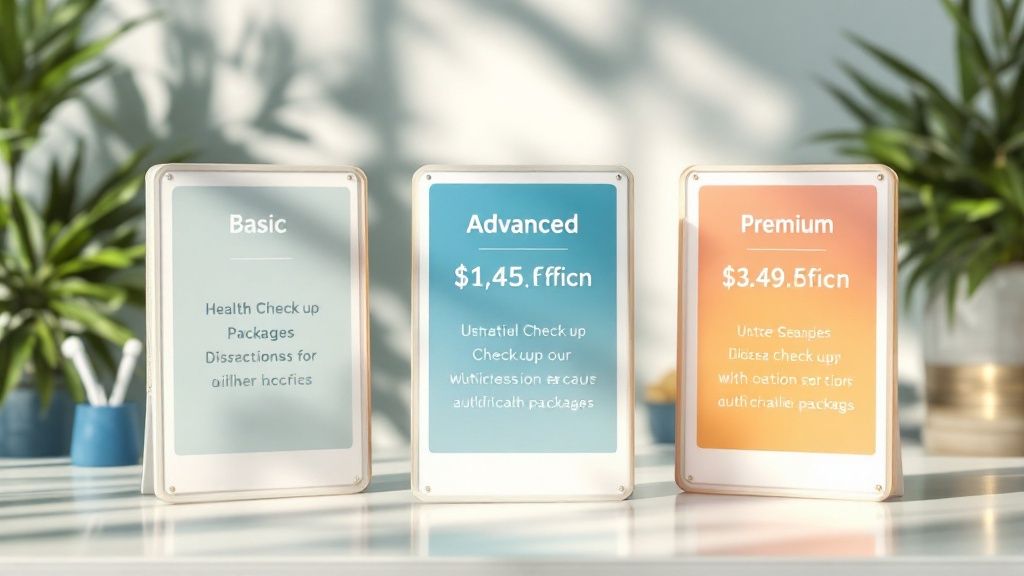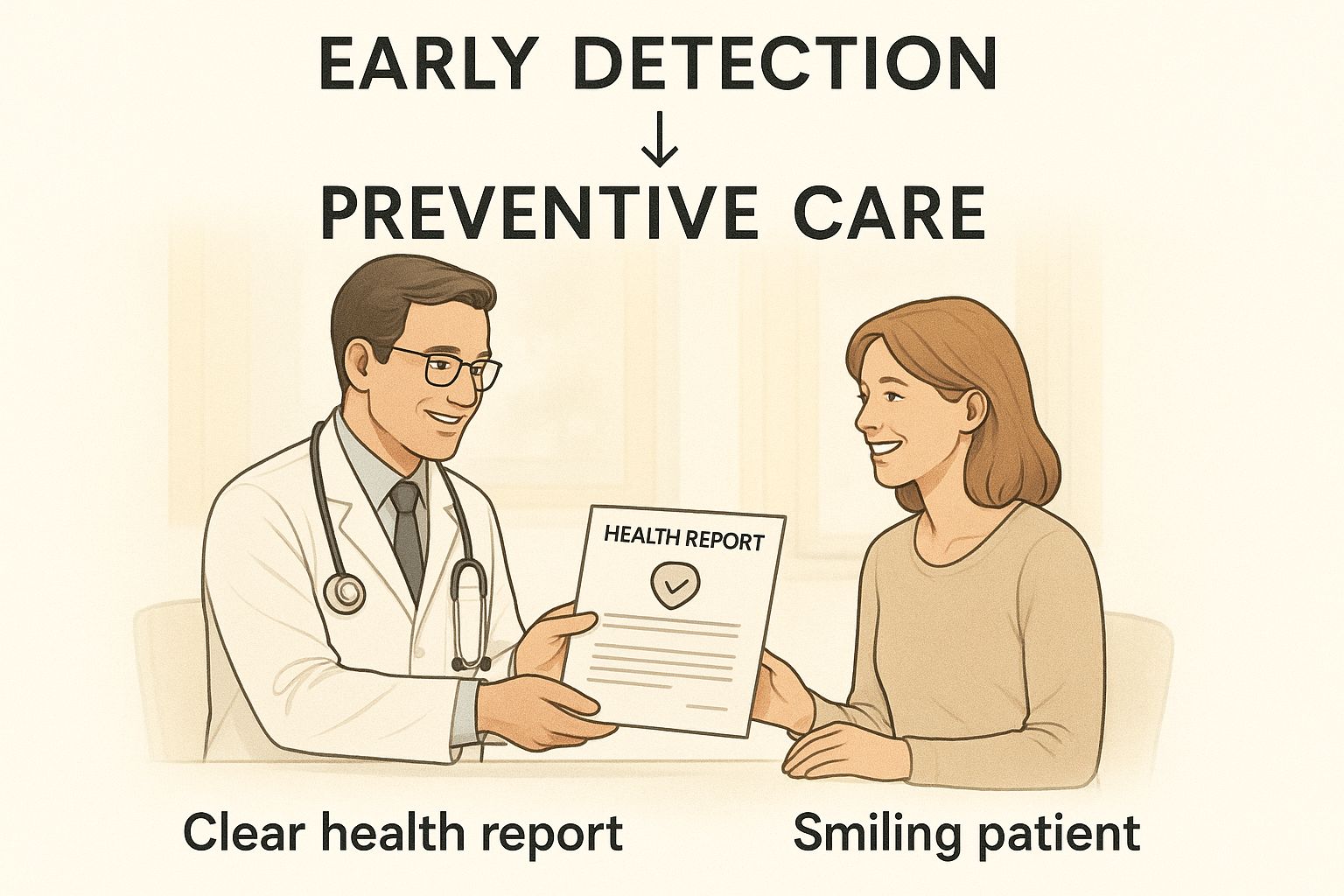In our fast-paced lives, finding comprehensive health checkup packages in Bangalore that fit both your schedule and your needs is a vital step toward taking control of your well-being. These packages are a structured way to monitor your health, providing insights that can help detect potential issues before they become serious.
Why Proactive Health Is Your Best Investment

Living in a bustling city like Bangalore makes it easy to postpone health concerns. However, a reactive approach often means dealing with problems when they are more advanced and harder to manage.
Proactive health management is about actively overseeing your wellness journey. Think of it like servicing your car; you wouldn't wait for the engine to fail before visiting a garage. A regular health checkup is preventive maintenance for your body. It helps catch silent risk factors and early warning signs, giving you the chance to intervene early.
The Power of Early Detection
Many serious conditions, such as high blood pressure, diabetes, and high cholesterol, often develop without obvious symptoms in their initial stages. A routine checkup can uncover these hidden threats before they escalate.
A health checkup provides a clear baseline of your health. This baseline allows you and your doctor to track changes over time and make informed decisions together, rather than reacting to a crisis.
This early awareness empowers you to make small lifestyle adjustments or start treatments that can prevent a minor issue from becoming a major one. For a deeper dive into this, you can explore our other resources on preventive health check-ups.
A Strategic Investment in Your Future
Viewing a health checkup as an expense is a common mistake. In reality, it is a smart investment in your long-term quality of life. The cost of a preventive screening is minimal compared to the potential physical, emotional, and financial toll of treating an advanced illness.
Key benefits of making regular checkups a priority include:
- Peace of Mind: Knowing your health status provides reassurance and reduces anxiety about the unknown.
- Empowered Health Decisions: Understanding your health metrics allows for more productive conversations with your doctor.
- Long-Term Savings: Catching issues early often leads to simpler, less expensive treatments compared to managing chronic conditions later.
Ultimately, choosing from the available health checkup packages in Bangalore is a commitment to yourself. It's a proactive step toward a healthier future. Remember, this guide is for informational purposes. Always consult with your primary physician for personalised advice regarding your health.
Decoding the Types of Health Checkup Packages
Choosing a health checkup package can seem confusing with terms like 'basic', 'comprehensive', and 'specialised'. Understanding these categories is the first step to selecting the right set of tests for your age, health, and lifestyle.
Think of a Basic Health Checkup as essential servicing for your body. It is designed to provide a quick snapshot of your current health by covering fundamental tests. This package is well-suited for younger adults, typically under 30, with no known family history of chronic illness. Its primary purpose is to establish a baseline and detect common issues early.
The Foundational Tier: Basic Checkups
A basic package bundles a core set of tests for a broad overview of your well-being. These foundational checks are crucial for spotting the early signs of common lifestyle diseases.
It typically includes:
- Complete Blood Count (CBC): A general look at your blood cells to screen for conditions like anaemia or infections.
- Blood Sugar Levels: An essential check for early signs of diabetes or pre-diabetes.
- Lipid Profile: Measures cholesterol and triglycerides, key indicators of heart health.
- Urine Routine Analysis: Helps identify issues with kidney function or potential urinary tract infections.
This package is an ideal starting point for anyone wanting to be proactive about their health without being overwhelmed by data.
Digging Deeper: Comprehensive and Master Checkups
For individuals in their mid-30s and beyond, or those with lifestyle risks such as a high-stress job or a family history of illness, a more detailed evaluation is advisable. This is where Comprehensive or Master Health Checkups are beneficial.
These packages offer a deeper look into your body's systems and are often referred to as comprehensive health panels. They build on basic tests by adding more specialised evaluations. To help you decide, here is a quick comparison of the common tiers.
Comparing Health Checkup Package Tiers
Package TypeTypical Tests IncludedBest ForBasicCBC, Blood Sugar, Lipid Profile, Urine AnalysisAdults under 30 with no specific health complaints or family history of chronic disease.Comprehensive/MasterAll Basic tests plus Liver Function, Kidney Function, Thyroid Profile, Vitamin D & B12, ECGAdults over 35, individuals with lifestyle risk factors, or those with a family history of illness.SpecialisedTargeted tests like Echocardiogram, Mammogram, Pap Smear, Bone Density, HbA1cIndividuals with specific health concerns, a known family history of certain diseases, or particular demographic needs (e.g., cardiac, women's health).
This table provides a starting point, but the choice should always be tailored to your unique situation. If you have any doubts, consult your primary physician.

Tailored for You: Specialised Packages
Many diagnostic centres in Bangalore offer specialised packages for specific health concerns or demographics. This focused approach ensures you get the most relevant tests.
These targeted packages often include:
- Cardiac Health Packages: Crucial for anyone with a family history of heart disease or other cardiovascular risks. They usually include an Electrocardiogram, Echocardiogram (Echo), and sometimes a Treadmill Test (TMT).
- Women's Wellness Packages: Designed to address the unique health needs of women, often including a Pap smear, mammogram (depending on age), and hormone level checks.
- Senior Citizen Packages: These packages focus on age-related conditions, with tests for bone density, vitamin deficiencies (B12 and D), and more in-depth organ function assessments.
- Diabetes Management Packages: For individuals with diabetes or at high risk, these checkups monitor long-term blood sugar control (HbA1c), kidney function, and other related health markers.
Remember, the goal is not to choose the package with the most tests, but the one with the right tests for you. A discussion with your doctor is the best way to determine the most suitable package based on your health profile and history, ensuring your investment is both effective and meaningful.
What Key Tests in Your Checkup Actually Reveal

A health report filled with technical terms can be confusing. Understanding what these tests measure is key to having a meaningful conversation with your doctor. This section decodes the common tests found in health checkup packages in Bangalore. Your report is not a final grade but a detailed map of your body's current state.
Your Blood's Story: The Complete Blood Count
The Complete Blood Count (CBC) is a fundamental test that provides a broad overview of your health by counting different cell types in your blood. This single test can indicate a range of issues. For instance, it measures red blood cells to help spot conditions like anaemia. It also counts white blood cells, and elevated numbers could point to an infection.
Gauges for Your Vital Organs: LFT and KFT
Your liver and kidneys are the body's primary filtration systems. The Liver Function Test (LFT) and Kidney Function Test (KFT) act as performance gauges for these crucial organs. The LFT checks levels of specific enzymes and proteins in your blood, which can signal liver damage or disease. Similarly, the KFT assesses how well your kidneys are clearing waste, which is vital for catching early signs of kidney issues.
Monitoring these key organ functions allows you and your doctor to take preventive action. Simple lifestyle shifts or early medical intervention can often protect these organs from long-term damage, highlighting the value of routine screening.
Assessing Heart Health: The Lipid Profile
Your Lipid Profile is a critical checkpoint for assessing your risk of cardiovascular disease. It measures different types of fats, like cholesterol and triglycerides, in your blood.
It’s a panel of results that provides a nuanced picture of your heart health:
- Total Cholesterol: The overall amount of cholesterol in your blood.
- LDL (Low-Density Lipoprotein): Often called "bad" cholesterol. High levels can lead to plaque buildup in your arteries.
- HDL (High-Density Lipoprotein): Known as "good" cholesterol, this helps carry excess cholesterol away from your arteries.
- Triglycerides: Another type of fat in your blood. Elevated levels can also increase your risk of heart disease.
Understanding the balance between these numbers is more informative than looking at total cholesterol alone.
Blood Sugar: A Three-Month Snapshot with HbA1c
While a fasting blood sugar test provides a momentary snapshot of your glucose levels, the HbA1c test reveals your average blood sugar levels over the past two to three months. This makes it a powerful tool for diagnosing and managing diabetes. If a checkup flags elevated blood sugar, it's important to understand what prediabetes means and steps to reverse it. The HbA1c provides a stable and reliable picture of how your body manages sugar over time.
Most annual health checkup packages in Bangalore are comprehensive, often covering around 90-92 test parameters. These typically include the CBC, LFT, KFT, Lipid Profile, and HbA1c, along with checks for inflammation markers, thyroid function, and key vitamin levels like B12 and D. This information is meant to empower you, not replace professional medical advice. Always consult with your doctor to interpret your report and determine the right next steps for your health.
How to Choose the Right Package for Your Needs
Selecting the right health checkup package in Bangalore should be a considered decision based on your individual needs. The ideal package differs for everyone. This guide provides a simple framework based on four key factors: your age and gender, your lifestyle, your family’s medical history, and any current health concerns.
Start with Your Age and Gender
Your age and gender are the best starting points for narrowing down your choices, as health risks change over time.
- For individuals in their 20s and early 30s: A basic package is usually sufficient. The main goal is to establish a health baseline and screen for common lifestyle issues.
- For adults 35 and over: The risk for certain conditions increases. It is sensible to consider a more comprehensive package that includes detailed cardiac screening (like an ECG), liver and kidney function tests, and a thyroid profile.
- Gender-specific needs: Women's health packages may include a Pap smear and might recommend a mammogram depending on age. Packages for men might focus more on prostate health or testosterone levels.
Using these general guidelines can help you filter the long list of health checkup packages in Bangalore to a more manageable set of options.
Evaluate Your Unique Lifestyle
Your daily habits significantly impact your long-term health. Consider these lifestyle factors:
- Stress Levels: Chronic stress can affect blood pressure and hormone levels.
- Dietary Habits: A diet high in processed foods or sugar may warrant closer monitoring of your lipid profile and HbA1c levels.
- Physical Activity: A sedentary lifestyle increases the importance of screenings for cardiac and metabolic health.
- Smoking or Alcohol Use: These habits raise the risk for various diseases, making targeted screenings advisable.
Matching your package to your lifestyle ensures the tests are relevant to your primary risk factors.
It is crucial to remember that this guide offers a framework and is not a substitute for professional medical guidance. The most effective decision is always made in partnership with your primary physician.
Your doctor can provide a personalised recommendation that fits your individual needs.
Consider Your Family's Medical History
Your family's health history provides valuable clues about conditions you might be more likely to develop. If certain illnesses run in your family, you can be proactive by choosing a package that screens for them. For instance, a strong family history of heart disease suggests prioritising a package with advanced cardiac markers. Similarly, a family history of diabetes would make an HbA1c test important.
Address Any Current Symptoms
Listen to your body. Any new or persistent symptoms should influence your choice of health checkup. Do not ignore issues like constant fatigue, digestive troubles, or unexplained aches. These symptoms can be signals from your body. For example, if you've been feeling unusually tired, a package that includes tests for thyroid function, vitamin deficiencies (B12 and D), and anaemia could provide answers. Discuss your current symptoms with your doctor to ensure your checkup is as effective as possible.
Understanding Costs and Finding True Value
When reviewing health checkup packages in Bangalore, price is a significant factor. Costs vary widely, so understanding what influences these numbers helps in making a choice that fits your budget and health goals.
The price is directly tied to the complexity of the package. A basic screening with fewer tests will be more affordable than a comprehensive one with numerous markers and advanced imaging. The reputation and accreditation of the diagnostic centre also play a role.
Breaking Down the Price Tiers
To clarify costs, packages can be grouped into three main tiers: economy, regular, and executive. Each is designed for a different level of detail and budget.
- Economy Packages: These are the most budget-friendly options, covering fundamentals like a complete blood count and blood sugar levels. They are a good starting point for younger individuals.
- Regular Packages: This mid-range tier offers a more detailed look, usually adding tests for liver function, kidney function, and a full lipid profile. It is a popular choice for an annual check-in.
- Executive Packages: These are the most thorough, bundling an extensive list of tests, often including cardiac screenings (ECG or TMT), vitamin level checks, and sometimes cancer markers.
You can reach out to us at +919355510357 to find out what plan would be best suitable for you.
Looking Beyond the Price Tag
While cost is important, the cheapest option is not always the best value. True value comes from getting the right tests for your specific health profile from a trusted facility. An inexpensive package that omits a crucial marker related to your family history is a missed opportunity.
The real investment is the quality of information you receive about your health. The goal is to gain actionable insights that empower you and your physician to make proactive decisions.
Before making a final decision, consult your primary physician. They can help you determine which tests are necessary, ensuring you invest wisely in your long-term health. You can explore more about the importance of preventive medicine and tailored checkups.
Exploring Your Existing Benefits
Many people overlook existing benefits that can reduce out-of-pocket costs. Many companies in Bangalore offer annual health screenings as part of their corporate wellness programs. Check with your HR department to see what is covered. Additionally, some personal health insurance policies include coverage for preventive health checkups. Investigating these options can make even a comprehensive package much more affordable. Confirm the specific details with your insurance provider, as policies vary.
Common Questions About Your Health Checkup
Preparing for a health checkup can bring up a few questions. Getting clear answers beforehand can make the process smoother. This section covers practical questions about health checkup packages in Bangalore, from preparation to understanding your results.
How Should I Prepare for My Appointment?
Proper preparation is essential for accurate test results. While instructions may vary slightly depending on your chosen package, some general rules apply. The most important is fasting. Most blood tests, especially those for blood sugar and lipids, require you to fast for 8 to 12 hours. This means no food or drink, except for plain water.
Here are a few other key tips:
- Stay Hydrated: Drinking plain water is encouraged as it can make the blood draw easier. Avoid coffee, tea, or juice during your fasting period.
- Medication: Continue your regular prescribed medications unless your doctor advises otherwise. Inform the diagnostic centre staff about any medications you are taking.
- Avoid Alcohol and Smoking: Refrain from alcohol and smoking for at least 24 hours before your appointment, as they can interfere with your results.
- Wear Comfortable Clothing: Choose loose-fitting clothes to make it easier for technicians to check your blood pressure or perform an ECG.
How Often Should I Get a Health Checkup?
The frequency of health checkups depends on your age, current health, and risk factors. For healthy adults in their 20s and early 30s with no significant family history of disease, a checkup every two to three years is generally sufficient to establish a baseline.
For anyone over 35, or those with lifestyle risks like a sedentary job, high stress, or a family history of conditions like diabetes or heart disease, an annual health checkup is recommended. This regular schedule allows you and your doctor to spot changes over time.
Ultimately, this is a conversation to have with your doctor, who can recommend a schedule that fits your unique health profile.
What Happens If My Results Are Abnormal?
An "abnormal" result on your report can be concerning, but it is not a diagnosis. It is a signal that something needs a closer look. Many factors can cause a temporary variation in test results, including diet, stress, or a minor infection. Your doctor will interpret these numbers within the context of your overall health.
If a result is flagged, your doctor may suggest:
- Repeat the Test: To see if the result was a one-time anomaly or a consistent pattern.
- Further Investigations: More specific tests may be recommended to get a clearer picture.
- Lifestyle Modifications: For borderline issues like high cholesterol or blood sugar, simple changes to diet and exercise are often the first step.
- Specialist Consultation: You might be referred to a specialist, such as a cardiologist or an endocrinologist, for a more detailed evaluation.
Your health checkup report is the beginning of a conversation with your doctor, not the final word.
Can I Claim Tax Benefits for a Health Checkup?
Yes. In India, preventive health checkups qualify for tax deductions under Section 80D of the Income Tax Act. This incentive encourages proactive health management.
You can claim a deduction of up to ₹5,000 per financial year for preventive health checkups. This amount is part of the overall Section 80D limit of ₹25,000 for individuals (and ₹50,000 for senior citizens). To claim the benefit, you need a tax-compliant receipt from the diagnostic centre. This is another reason to choose a reputable, accredited facility. For specific questions about financial planning, it is best to consult a tax professional.
At Docube Clinics, we offer a range of comprehensive health checkup packages designed to provide clear insights into your well-being. Our expert team is here to support you at every step, from choosing the right package to understanding your results. Take a proactive step towards a healthier future and book your appointment with us today. Find out more at https://docube.in.



